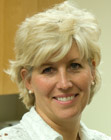Helen Piwnica-Worms, Ph.D., has been named the first Gerty T. Cori Professor at Washington University School of Medicine in St. Louis.

The appointment was announced by Larry Shapiro, M.D., executive vice chancellor for medical affairs, the Spencer T. and Ann W. Olin Distinguished Professor and dean of the School of Medicine.
The Gerty T. Cori Professorship is named in honor of a University faculty member who shared the Nobel Prize for Medicine with her husband and fellow faculty member Carl Cori in 1947. They received the prize for their studies of the control of sugar metabolism.
Cori was the first female scientist to receive the Nobel Prize in Medicine. In April, she and three other U.S. scientists will be recognized for their significant accomplishments on a set of U.S. Postal Service stamps.
“Gerty Cori was one of the most preeminent female scientists of the 20th century,” said Piwnica-Worms, who also is a Howard Hughes Medical Institute investigator. “It is a tremendous honor to be awarded a professorship named in her honor. I can only hope that my work will have a fraction of the impact that her pioneering discoveries had in biomedicine.”
The professorship is endowed as a component of the University’s BioMed 21 initiative. That initiative is dedicated to speedily translating laboratory discoveries into new approaches for patient diagnosis and treatment.
“Helen’s studies focus on very basic inquiries into the life cycle of the cell, and she’s proven herself adept at applying the insights she gains in cancer treatment and other critical areas of clinical research,” says Shapiro.
Piwnica-Worms’ research has helped show how mechanisms known as checkpoints interface with the cell cycle machinery to delay the cell’s progress through its life stages. The delays provide cells with important opportunities to inspect their DNA for damage. If damage is detected, cells can attempt repairs or self-destruct to prevent that damage from leading to cancer.
The new professorship is one of four established by John F. McDonnell and the JSM Charitable Trust to support the BioMed 21 initiative. The professorships are all named for Nobel Prize-winning faculty members from Washington University. The McDonnell family, through its foundation and personal giving, has provided substantial support to Washington University over the years. In addition to establishing numerous professorships, they have made generous gifts in support of facilities and research efforts at the University. McDonnell, the younger son of honored aerospace pioneer James S. McDonnell, is vice chairman of the Washington University Board of Trustees and has served on the board since 1976.
“Washington University is very grateful for the continued generosity and leadership of John F. McDonnell,” Washington University Chancellor Mark S. Wrighton says. “The support he and the foundation provide to the University has been essential to our ability to reward and encourage the accomplishments of talented faculty members. In turn, the achievements of these faculty members have helped maintain and advance Washington University’s position as a national leader in research and education.”
Piwnica-Worms received her doctorate at Duke University Medical School and did postdoctoral research at the Dana-Farber Cancer Institute. Prior to her appointment at Washington University in 1994, she held appointments at Tufts University School of Medicine, Harvard Medical School and Beth Israel Hospital.
Piwnica-Worms has won national and international recognition for her scientific contributions. She was a Damon Runyon fellow and a Pew Scholar of the Biomedical Sciences. In addition, Piwnica-Worms was a recipient of the Spirit of Health Award for Cancer Research from the American Cancer Society. She has been elected to the Board of Directors of the American Association for Cancer Research and named a Fellow of the American Association for the Advancement of Science and the Academy of Science of St. Louis.
At Washington University, Piwnica-Worms has served on search committees for the heads of several medical school departments and on the Medical Science Training Admission Committee for nine years. She helped build the molecular oncology program at Washington University. At the Alvin J. Siteman Cancer Center, she leads the cell proliferation program, is a member of the Executive Committee, the Basic Science Leadership Committee and the Cancer Biology Pathway Selection Committee.
Washington University School of Medicine’s 2,100 employed and volunteer faculty physicians also are the medical staff of Barnes-Jewish and St. Louis Children’s hospitals. The School of Medicine is one of the leading medical research, teaching and patient care institutions in the nation, currently ranked fourth in the nation by U.S. News & World Report. Through its affiliations with Barnes-Jewish and St. Louis Children’s hospitals, the School of Medicine is linked to BJC HealthCare.